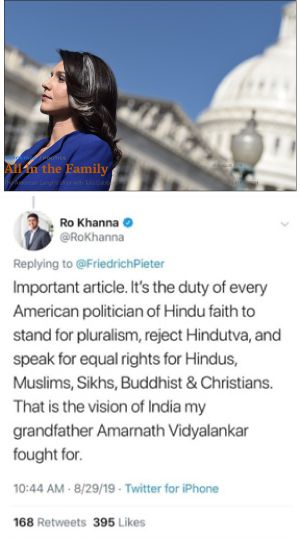The cozy relationship between Hindu Americans and the Democratic Party has come under severe strain.

The open hostility of some Democratic Party leaders over India’s handling of the Kashmir issue and their support to Pakistani Muslims has caused consternation among Indian Americans in general and Hindu Democrats, in particular.
Added to this volatile issue is the efforts of the Indian leftist organizations and Pakistani Muslim organizations in the U.S. orchestrating protest demonstrations against the much-publicized visit of Indian Prime Minister Narendra Modi to Houston on Sept. 22.
The latest episode which precipitated a crisis of confidence between Hindu Americans and Democratic Party leaders is a tweet by Indian American US. Rep. Ro Khanna from California.
Khanna is a supporter of Bernie Sanders for President.
Khanna referred to an article in The Caravan magazine which attacked Presidential Candidate Tulsi Gabbard for her ties with Hindu groups in the U.S. and Hindu organizations in India.
Khanna described the hit piece by Pieter Friedrich as an “important article.”“It’s the duty of every American politician of Hindu faith to stand for pluralism, reject Hindutva, and speak for equal rights for Hindus, Muslims, Sikhs, Buddhist[s] & Christians,” wrote Khanna on Twitter on August 29.
“That is the vision of India my grandfather Amarnath Vidyalankar fought for. Vidyalankar (1901-1985), who was repeatedly jailed for participating in India’s struggle for independence, later served as a Member of Parliament in the Republic of India,” Khanna said in the tweet.
Khanna’s tweet is seen as an example for “Biting the hand that feeds.
In another episode, US Senator and Democratic Presidential candidate Bernie Sanders, addressing the annual convention of the Islamic Society of North America in Houston on Aug. 31, said India’s action in Kashmir was “unacceptable.”
Sanders said he was deeply concerned about the situation in Kashmir and asked the US government to speak in favor of U.N. backed resolution.
Soon after India withdrew the special status accorded to Kashmir, Muslim religious organizations staged a protest outside the Indian Consulate in Houston.
Meanwhile, The Ismaili Jamathkana in Sugar Land, a part of the Aga Khan Council Southwestern U.S., withdrew its partnership with the committee hosting Prime Minister Modi’s visit to Houston.
Pakistani Muslims praised the organization “for standing up for human rights and doing the right thing” in withdrawing support to Modi’s event.
The antagonism between the Indian community and the Pakistani community in Houston is not new, but that adverse relationship rarely spilled over in public forum.
However, there is a section of Muslims from India, who under the banner of Indian Muslims of Association of Greater Houston, is cordial with Hindu groups and Indian PM Modi.
Many leftists Indian organizations in the U.S. have been campaigning against India’s Hindu Nationalist Party and Modi for many years so much so the U.S. government denied visa to Modi, when he was the chief minister of Gujarat state.
While the leftists and Democrats have been not friendly to Hindu political groups, local Hindu leaders supported the same Democrats.
Some of those who supported Modi, India and its right wing party, opposed President Donald Trump and the Republican Party in the U.S.
Mostly the anit-Trump sentiments led a section of Hindus toward Democrats and this group may be called for convenience, “establishment” Hindus. But, there have been Indians who have been Democrats, even before the Trump-era and they are not necessarily pro-establishment Hindus.
The role of Sri Kulkarni, a Democrat who owed his political ascendency to the establishment Hindus, is now drawing scrutiny.
He is friendly with both Hindus and Muslims and he attends Pakistani programs and Hindu events. He has not openly criticized Pakistan or supported India on its stand on Kashmir.
In fact, he criticized Congressman Pete Olson for calling Pakistan a terrorist state, during India’s Independence Day celebrations at India House in Houston last year.
Indians, who are Republicans, find this dichotomy or contradiction among establishment Hindus inexplicable.
A case in point. Last year World Hindu Congress was convened in Chicago.
Leftists forced Democratic Party elected officials from attending the event. Tulsi Gabbard, a self-avowed Hindu, was forced to withdraw from attending the Congress.
Even Hindu American Foundation, an organization funded by the so-called right-wing Hindu activists, did not openly associate itself with the World Hindu Congress.
Now, the same HAF is getting its bitter pill, when its left-wing and Democratic supporters are piling up on Hindutva.
The irony is that HAF strongly supports Kashmiri Hindus and supports government of India’s recent action.
Rep. Brad Sherman (D-CA), Co-Chair of the Congressional Caucus on India and Indian Americans and a member of the House Foreign Affairs Committee, has filed H.Res. 408 “Resolution Condemning Pakistan-based Terrorism in India, Supporting the Rights of Kashmiri Pandits.”
A section of Hindus has been annoyed by the establishment Hindus’ support to Democrats like Khanna and Kulkarni.
This discord among Hindus has been simmering for some time. Now, the time has come for reckoning.
The Hindu Democrats are now under pressure to revisit their policy of supporting Democrats who are not friendly to Hindu groups or Indian policies.
The right will be right and the left will be left, whether it is Indian politics or American politics.
The establishment Hindus sought to straddle this political divide so far.
Would the Indian right remain compatible with the left in the U.S.?





